To learn more about Digital Green’s AI-powered platform and how it impacts small-scale farmers in India, Ethiopia, Kenya, Nigeria and Nepal, we encourage you to sign up for our newsletter.
A Step Forward to Climate Smart Agriculture with the Digital Empowerment of Women Farmers

In India, women farmers are one of the most marginalized groups, having very limited access to resources, advisories, credit, and technology than their male counterparts. There are many government schemes and policies introduced for the advancement of women with the idea to enhance their capacity, crop yields, and income, to lift them out of poverty. In this order, the Ministry of Agriculture & Farmers Welfare has implemented various programmes for farmers, including women in the agriculture sector. The guidelines of Centrally Sponsored Schemes/Missions such as Support to State Extension Programmes for Extension Reforms under the Sub-Mission on Agricultural Extension (SMAE), and National Food Security Mission, among others, stipulate that States and other Implementing Agencies are required to earmark at least 30% expenditure on women farmers.
The primary objective of “Mahila Kisan Sashaktikaran Pariyojana (MKSP),” implemented by the Ministry of Rural Development is to empower women in agriculture by making systematic investments to enhance their participation and productivity, as well as create and sustain agriculture-based livelihoods of rural women. Under the Jharkhand State Rural Livelihood Promotion Society (JSLPS), this project has been implemented in such a manner that the skill base of the women in agriculture is enhanced to enable them to pursue their livelihoods in a sustainable basis.
We say that we need to empower a woman, but being a woman; I believe a woman is born empowered, we just need to be aware of it. We have the power in us to make our own decisions and persuade anyone of what we want to do and what we think is good for us, we just need to apply that power at the right time and place.
This awareness is more visible among rural women after the implementation of the ‘Digital Empowerment to Enhance Productivity’ (DEEP) project on the ground and the ownership of a video-based approach by these women. This project aimed at building the technological skills of frontline workers (FLWs) and farmers, especially women-led farmers organizations (FPOs) and small and marginal farmer collectives. In this order, Digital Green has trained frontline agricultural extension workers to reach small and marginal farmers in community-led digital promotion of improved agricultural practices. This project is generously funded by Accenture CSR Pvt. Ltd. and is being implemented in collaboration with MKSP-JSLPS. The project incorporates Digital Green’s highly acclaimed video-based approach (VBA). VBA involves the development of appropriate content based on formative research, producing short videos to demonstrate the application of new methods, and disseminating the videos to farmers. These video advisories have enhanced the digital literacy of rural women and the PoPs provided to them as an advisory for best practices of Climate Smart Agriculture (CSA) and women collectives to enhance their awareness and knowledge, making their work easier and more effective than earlier. Below are some of the impact stories shared by the women:
- A woman farmer named Navanti Birua in Jharkhand has taken the initiative to make her own decisions even after being refused many times by her fa
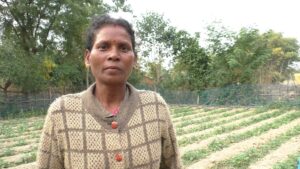 mily. In a refresher and planning meeting at Tantnagar block of West Singhbhum district with all the block officials, cadres, and farmers, she happily shared her experience and said that: “I have learned from the video advisory on potato crop and tried it on a small scale to see the difference from traditional farming and I am surprised to see that my potato crop is healthy and grows very fast, where in just a week time the growth is parallel to one-month crop with traditional farming. The yield is also higher which I can compare to the production cost. On my main crop field, I have not treated the seeds and used chemical fertilizers and pesticides for better growth and yield but in my small bari I have sown treated seeds and also used the organic method, which has given me such a great result. Now, my husband and all family members are supporting me so, from next season I will adopt this technique on my whole potato farm field, and I want to give a message to all farmers that this video advisory is very helpful and if it is benefitting me then it will benefit you also.”
mily. In a refresher and planning meeting at Tantnagar block of West Singhbhum district with all the block officials, cadres, and farmers, she happily shared her experience and said that: “I have learned from the video advisory on potato crop and tried it on a small scale to see the difference from traditional farming and I am surprised to see that my potato crop is healthy and grows very fast, where in just a week time the growth is parallel to one-month crop with traditional farming. The yield is also higher which I can compare to the production cost. On my main crop field, I have not treated the seeds and used chemical fertilizers and pesticides for better growth and yield but in my small bari I have sown treated seeds and also used the organic method, which has given me such a great result. Now, my husband and all family members are supporting me so, from next season I will adopt this technique on my whole potato farm field, and I want to give a message to all farmers that this video advisory is very helpful and if it is benefitting me then it will benefit you also.”  Similarly, a woman frontline worker named Gudiya, from Chitarpur block in Ramgarh district, who is the Aajeevika Krishak Sakhi (AKS) in Murubanda village is sharing knowledge on agricultural activities with farmers through videos. She spoke in a cadres meeting that this new digital technology has made her work easier. More farmers are now understanding, believing in the video advisories, and adopting them, which before was difficult by giving verbal training at community meetings, and also there was the extra effort of needing to explain all the advisories in practical terms. Now, farmers are also demanding other farming videos to be shown in the meeting as they found these videos interesting and relevant to their work. As a result, Gudiya is disseminating these videos in more community meetings and gatherings, and gaining respect among community members.
Similarly, a woman frontline worker named Gudiya, from Chitarpur block in Ramgarh district, who is the Aajeevika Krishak Sakhi (AKS) in Murubanda village is sharing knowledge on agricultural activities with farmers through videos. She spoke in a cadres meeting that this new digital technology has made her work easier. More farmers are now understanding, believing in the video advisories, and adopting them, which before was difficult by giving verbal training at community meetings, and also there was the extra effort of needing to explain all the advisories in practical terms. Now, farmers are also demanding other farming videos to be shown in the meeting as they found these videos interesting and relevant to their work. As a result, Gudiya is disseminating these videos in more community meetings and gatherings, and gaining respect among community members.
- A farmer named Kiran Devi in Kurhagarha village, Katkamsandi block from Hazaribagh district has adopted Natural Pest Management (NPM) practices for potato crop cultivation. She is happy to see the results and shared that her potato plants are grown thicker than earlier and growth is also fast. She also noticed that by using regular and systematic techniques, as per the video advisory, there was no pest attack on her crop.
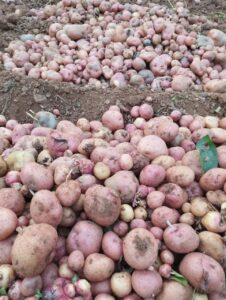
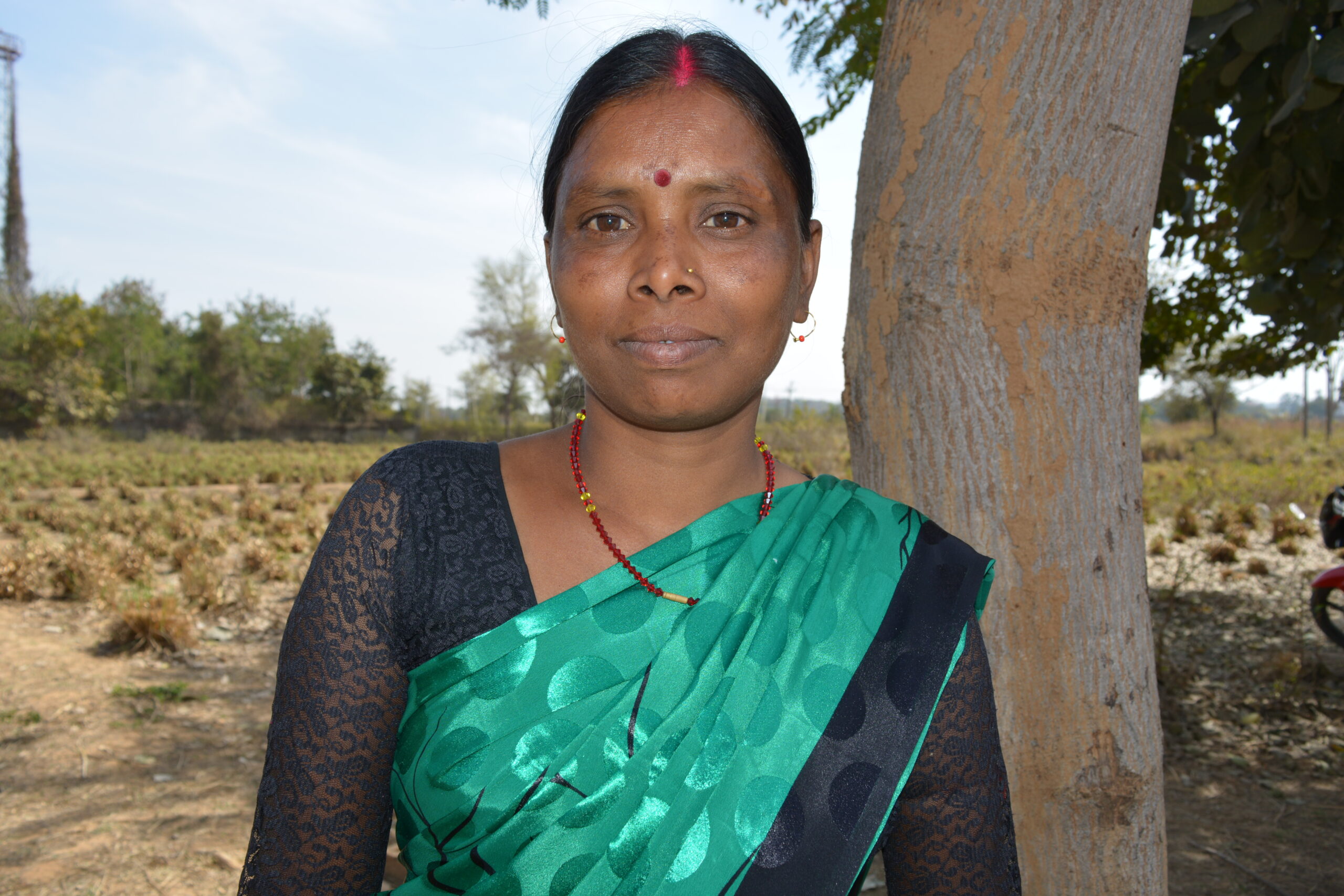 When she decided to adopt the practice, her family members agreed with her but some people in the village were making fun of her that her crop would be at risk and saying; Why are you trying these new things? You will bear loss this season because you are not using traditional methods, which we have been doing for years. But she replied that “whatever happens, will happen with my crop and I would be responsible for it and if there is any loss, it would be my loss. So I will take risks and try this new method because I believe in it.” But after the positive results, everyone was surprised and told her that they will also adopt this method and that if their family refused, they will point to her as an example.
When she decided to adopt the practice, her family members agreed with her but some people in the village were making fun of her that her crop would be at risk and saying; Why are you trying these new things? You will bear loss this season because you are not using traditional methods, which we have been doing for years. But she replied that “whatever happens, will happen with my crop and I would be responsible for it and if there is any loss, it would be my loss. So I will take risks and try this new method because I believe in it.” But after the positive results, everyone was surprised and told her that they will also adopt this method and that if their family refused, they will point to her as an example. - AKMs from Bishungarh block in Hazaribagh district took ownership of the VBA in their work after being trained on video dissemination as master trainers, and they shared the learnings among all the AKS in the block-level video dissemination training. They shared their experience in a community meeting and said that this approach has made their work easier and more effective. Rita Devi from Bedahariyara said: “From the time I started disseminating farming videos in our village, I have seen an increase in the number of farmers attending meetings and adopting these new techniques. This also helped in building trust and respect among farmers for my work and efforts.”
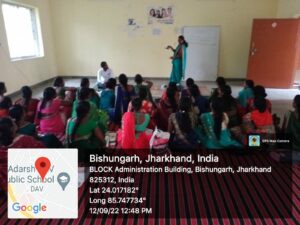
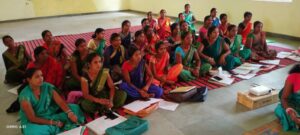 A few AKMs who took training from her also said that: “Earlier we used to explain to the farmers many times and adoption was less because they didn’t find the method authentic and if some of them tried to adopt the NPM practices, we had to make that practical for their understanding. That was increasing our efforts and comparatively less adoption was happening. But now, we are happy that we got this new idea of sharing our knowledge through digital tools. We are happy that we got such impressive tools that made our work so easy and effective.” Some farmers also said that they are now using video advisories in their crop fields and are excited to see the results. They have used NPM practices for seed treatment, irrigation, and disease and pest management. Also, they have used line sowing in cultivating mustard and wheat crops this season and found that the method has increased plant growth and given more yield compared to the traditional method.
A few AKMs who took training from her also said that: “Earlier we used to explain to the farmers many times and adoption was less because they didn’t find the method authentic and if some of them tried to adopt the NPM practices, we had to make that practical for their understanding. That was increasing our efforts and comparatively less adoption was happening. But now, we are happy that we got this new idea of sharing our knowledge through digital tools. We are happy that we got such impressive tools that made our work so easy and effective.” Some farmers also said that they are now using video advisories in their crop fields and are excited to see the results. They have used NPM practices for seed treatment, irrigation, and disease and pest management. Also, they have used line sowing in cultivating mustard and wheat crops this season and found that the method has increased plant growth and given more yield compared to the traditional method. - Twelve farmers from Piska village, Nagdi block in Ranchi district, adopted the video advisory on Mustard PoP in group farming to increase production. They
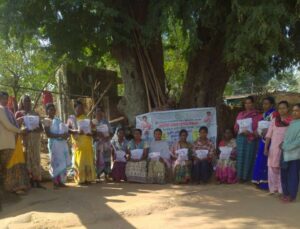 got 24 kg of black mustard seeds at a 100% subsidized rate under the National Food Security Mission and targeted for more yield than earlier, so after seeds distribution to farmers; the block team and AKS of that village decided to do group farming in a patch of 5.5 acres of land as the plots of those farmers are nearby and chose to adopt the CSA video advisories for mustard farming. They found it easier to do all the farming-related activities on time and convenient to look after the crop properly. This group farming also gave confidence to farmers to bear the minimum loss and do their work effectively with the help of each other, see the difference from traditional farming methods, and the impact of these advisories on the ground. They did all the practices starting from a seed treatment with Beejamrit, land preparation, line sowing, weeding, disease, and pest management using natural fertilizers and pesticides, and timely irrigation from Jeevamrit until harvesting, as had been shown in the video. It has demonstrated better results compared to the traditional farming method as farmers and the block team observed 55 kg yield per kg of seeds i.e.; 5kg (10%) more yield with this PoP, which was earlier 50kg yield per kg of seeds with traditional practices for black mustard. Because the crop growth was faster and not infected with any disease or pest, farmers are now delighted with the high yield and healthy crop, and they decided to adopt the same technique in their individual farm fields. Similarly, a few of them cultivated yellow mustard in their individual farm fields and observed 20% more yield i.e 60 kg yield per kg seeds, which was earlier 50 kg per kg of seeds.
got 24 kg of black mustard seeds at a 100% subsidized rate under the National Food Security Mission and targeted for more yield than earlier, so after seeds distribution to farmers; the block team and AKS of that village decided to do group farming in a patch of 5.5 acres of land as the plots of those farmers are nearby and chose to adopt the CSA video advisories for mustard farming. They found it easier to do all the farming-related activities on time and convenient to look after the crop properly. This group farming also gave confidence to farmers to bear the minimum loss and do their work effectively with the help of each other, see the difference from traditional farming methods, and the impact of these advisories on the ground. They did all the practices starting from a seed treatment with Beejamrit, land preparation, line sowing, weeding, disease, and pest management using natural fertilizers and pesticides, and timely irrigation from Jeevamrit until harvesting, as had been shown in the video. It has demonstrated better results compared to the traditional farming method as farmers and the block team observed 55 kg yield per kg of seeds i.e.; 5kg (10%) more yield with this PoP, which was earlier 50kg yield per kg of seeds with traditional practices for black mustard. Because the crop growth was faster and not infected with any disease or pest, farmers are now delighted with the high yield and healthy crop, and they decided to adopt the same technique in their individual farm fields. Similarly, a few of them cultivated yellow mustard in their individual farm fields and observed 20% more yield i.e 60 kg yield per kg seeds, which was earlier 50 kg per kg of seeds. 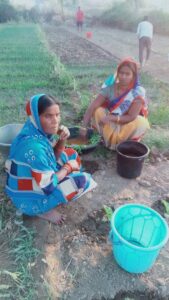
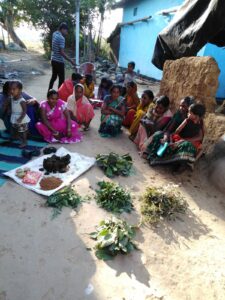
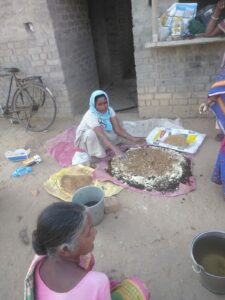
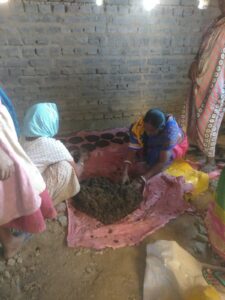 Farmers from Balumath block in Latehar district shared that they are now easily adopting NPM practices with the help of video advisories disseminated in their community meetings and facilitated effectively by AKSs. As the NPM practices have been promoted for years by the government, AKSs used to share the knowledge with farmers in their respective villages but every time a farmer decided to adopt this, AKSs had to prepare those organic manures and pesticides for them to understand the full method. But after the video advisories were implemented, most of the farmers adopted these NPM practices just after watching the videos and when additional support is needed in preparing these, they just watch the videos again on their smartphones and do it. Only those farmers who don’t have access to smartphones are seeking help from AKSs and other neighbour farmers who have adopted this earlier.
Farmers from Balumath block in Latehar district shared that they are now easily adopting NPM practices with the help of video advisories disseminated in their community meetings and facilitated effectively by AKSs. As the NPM practices have been promoted for years by the government, AKSs used to share the knowledge with farmers in their respective villages but every time a farmer decided to adopt this, AKSs had to prepare those organic manures and pesticides for them to understand the full method. But after the video advisories were implemented, most of the farmers adopted these NPM practices just after watching the videos and when additional support is needed in preparing these, they just watch the videos again on their smartphones and do it. Only those farmers who don’t have access to smartphones are seeking help from AKSs and other neighbour farmers who have adopted this earlier. - Laxmi Kumari, an AKS from Lupung village in Katkamsandi block of Hazaribagh district is using Pico and WhatsApp groups for sharing and disseminating
 video-based crop advisories in her village-level community meetings. She shared that after using these digital tools for video advisories the adoption has increased among farmers: “As the advisory is localized and time specific, farmers found it authentic and easy to understand and this has built a self-confidence in me to do my work more efficiently.” Where before she was approaching farmers individually to give crop advisory and adoption by them, and now farmers are calling her to visit their crop fields and see the benefits of adoption.
video-based crop advisories in her village-level community meetings. She shared that after using these digital tools for video advisories the adoption has increased among farmers: “As the advisory is localized and time specific, farmers found it authentic and easy to understand and this has built a self-confidence in me to do my work more efficiently.” Where before she was approaching farmers individually to give crop advisory and adoption by them, and now farmers are calling her to visit their crop fields and see the benefits of adoption.
She is delighted that now there is no need of visiting the farmers many times for a single advisory, as they can go through the videos shared on WhatsApp and can clear their doubts, only minimal telephonic support and observation are needed. There is also an increase in farmers attending community meetings to see videos and farmers have taken initiative to share the advisories with each other as they are experiencing fruitful results. 

 Rural community members and farmers from 3 different districts in Jharkhand (West Singhbhum, Gumla, and Simdega) have been trained in video production modules and become Video Resource Persons (VRPs) who are producing community videos on improved agricultural practices. These VRP team members also shared that they are happy and excited to produce videos, which would further be used in community training. They are proud that they would be contributing to the knowledge transfer of best practices to the farmers for better yield and income, which they will be documenting. This new work is encouraging and exciting for them, where they could not even come out of their home for work, now they are traveling to different villages for shooting, meet with new people and even convincing them to provide their time and work as actors in the videos. They are now confident about continuing with their work and producing videos on Climate Smart Agriculture (CSA) and Sustainable Agriculture (SA) practices.
Rural community members and farmers from 3 different districts in Jharkhand (West Singhbhum, Gumla, and Simdega) have been trained in video production modules and become Video Resource Persons (VRPs) who are producing community videos on improved agricultural practices. These VRP team members also shared that they are happy and excited to produce videos, which would further be used in community training. They are proud that they would be contributing to the knowledge transfer of best practices to the farmers for better yield and income, which they will be documenting. This new work is encouraging and exciting for them, where they could not even come out of their home for work, now they are traveling to different villages for shooting, meet with new people and even convincing them to provide their time and work as actors in the videos. They are now confident about continuing with their work and producing videos on Climate Smart Agriculture (CSA) and Sustainable Agriculture (SA) practices.
It was great to see the way they happily shared their stories, which led me to visit their farm fields and observe community video disseminations to observe the facilitation of AKSs and adoption results by the farmers. These stories of empowered women are inspiring and encouraging regarding the impact of the digital revolution and the adoption of CSA practices among rural women. The changes have made them confident in making their own decisions and living life with their own identity and respect.